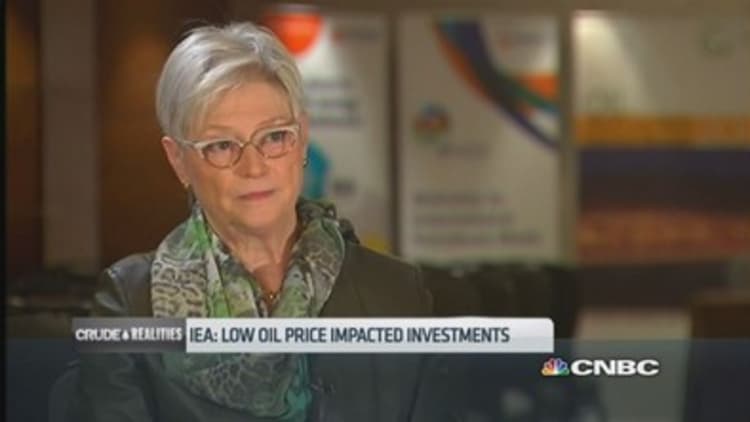
The global oil market could be out of balance for years, and it will never be the same because of U.S. shale production, the International Energy Agency said Tuesday.
"A partial rebound in oil prices over the last month following a 60 percent crash since June suggests market participants are seeing light at the end of the tunnel and growing confident that spending cuts by oil companies will lead to a market recovery," the IEA said in its February oil market report
"Yet supplies so far remain abundant, and it will take time for investment cuts to make more than a relatively small dent on production," the IEA said, noting that timing the recovery in oil prices was a key issue.
In the meantime, inventories are likely to build further, the IEA said. It predicted that by mid-2015, oil stocks among the 34-member countries of the Organization for Economic Cooperation and Development could come close to revisiting the all‐time high of 2.83 billion barrels reached in August 1998, shortly before the price of U.S. crude oil sank to an average monthly low of $11.22 per barrel.
IEA Executive Director Maria van der Hoeven described the current oil oversupply as "huge."
"Especially for the coming year, we see a market that is extremely well supplied, with very low demand growth," she told CNBC on Tuesday.
The price of oil has fallen from a high of $114 a barrel last June to the current price around $57.24 for benchmark Brent crude futures and $50.95 for U.S. crude—a rebound from the recent lows of around $45 a barrel seen amid a global glut in supply and lack of demand.
Read MoreOPEC is to blame for the oil price: BIS
Prices received a boost on Monday after the Organization of Petroleum Exporting Countries, the group of 12 major petrol exporters including Saudi Arabia, predicted that low prices would prompt demand later in the year and forecast a drop in non-OPEC production, such as oil production by U.S shale producers.
The IEA warned, however, that a full rebalancing of supply and demand in the oil market "could take years."
"It is not unusual in a market correction for such a gap to emerge between market expectations and current trends. Such is the cyclical nature of the oil market that the full physical impact of demand and supply responses can take months, if not years, to be felt," the report said.
"While price drops as large as were just experienced call for urgent measures by industry participants, the consequences of those steps can matter more in the next five to six years than in the near future, for today's investment decisions typically take years to translate into physical supply/demand reality."
Read MoreShock report: Oil to fall to $20 & an end to OPEC?
Even after rebalancing, Van der Hoeven said that the oil market would "never be the same as what it was."
"One of the biggest game changers is the development of shale gas in the U.S," she told CNBC. "Of course it is a different kind of production process. ... You're payback times are much shorter."
Also important was the postponement in investment, she added.
"Because of the low prices there has been some setback in investment. … Quite a few big investments are on hold and of course that will have its influence on the future market as well."
Van der Hoeven also emphasized the importance of geopolitical turbulence in forecasting trends in the oil market.
"What we can see happening in Iraq is quite important, because at this moment it is producing an enormous amount of oil. …Whether that will be sustainable is another question," she told CNBC.
"The other thing I would like to mention is Russia. … If there is one loser in this game, it is Russia," she added.
—CNBC's Katy Barnato contributed to this report.


